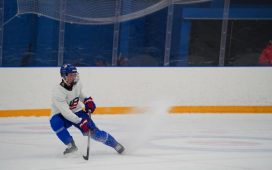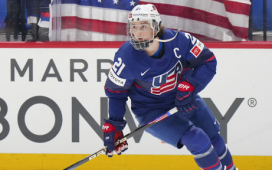The ECHL and Professional Hockey Players’ Association announced Wednesday the creation of a relief fund that will assist players and their families after the cancellation of the remainder of the 2019-20 season resulted in lost salary for many players.

This time last year, the Newfoundland Growlers were gearing up for a playoff run that would see them win the Kelly Cup as champions of the ECHL. It was a great, great season by anyone’s measure. But because the Growlers spent two months in a playoff marathon that was two more months, they got paid and were able to put off getting summer jobs. Plus they got bonus money for winning the championship.
And as captain of the Growlers, James Melindy was counting on another long run this spring. The Growlers were in first place in their division and primed to defend their title, that was until the league suspended, then cancelled, the rest of the season and the playoffs almost three weeks ago. Not only did it rob Melindy and his teammates of a chance to win a second championship, it also deprived them of three more regular-season paychecks, plus whatever they would have earned in the playoffs.
It was a devastating blow for the 500-plus players who play in the 26-team league, the vast majority of whom are not on NHL or AHL contracts. Some of them are and they are still getting paid, but the turn of events left hundreds of players in a difficult spot. Players such as Melindy, who owns a home in St. John’s, Nfld., and has a mortgage to pay. Melindy’s girlfriend, meanwhile, is a nurse who is on the front lines of the battle against the coronavirus.
So the announcement the league and the Professional Hockey Players’ Association made Wednesday was welcomed news. The two organizations are establishing an ECHL Relief Fund to assist players and families who are suffering financial hardships because of the abrupt cancellation of the season. The PHPA put up $200,000 to start the fund, while CaniBrands, a CBD products company, announced it would donate $10,000. The league will hold a series of auctions to raise money, while anyone looking to make an individual donation can do so at https://www.echl.com/covid19relieffund.
“The guys playing in this league aren’t doing it for the money,” Melindy said. “They’re doing it for the love of the game. This is obviously huge. I’m a homeowner and there are bills to be paid. For the guys who have kids and families, they’re really looking forward to paychecks coming in. It’s nice to see they’re doing the right thing for the players.”
Melindy is right about the love of the game. The average salary in the league is about $700 a week, with wages ranging from $600 a week for rookies to $1,500 a week for veterans. The league’s regular season lasts 26 weeks and the salary cap per team is just $13,300 per week for a roster of 20 players. Unlike the NHL and AHL, where players are paid a set amount for the season, ECHL players are paid weekly. So the longer they play, the longer they get paid and the more they make over the course of a season. And theirs is much of a nomadic lifestyle, with players jumping between the AHL and ECHL or Europe and changing teams regularly. Melindy, for example, has played pro hockey for seven seasons and has played for a total of eight teams, six in the ECHL and two in the AHL. This season marked the first time in his career that he has spent two seasons in the same place. For the first three years of his career, Melindy had a contract with the Arizona Coyotes that paid him $67,500 per season, plus a signing bonus of $75,000 per season, but has been on ECHL deals since.
“I’m in a decent spot financially to take care of things,” Melindy said. “But this fund will really help.”
Most players in the league are forced to take summer jobs, as Melindy did last summer when he helped his father as a welding inspector. He has also been a firefighter in the summer and during the season continues to work as a volunteer firefighter.
Compounding the problem is the fact that there is so much uncertainty that many players don’t know whether they’ll even be working this summer. Many of them supplement their incomes by running or working at summer hockey schools, but it’s likely they’ll be cancelled as well. “It could be a month, it could be a couple of months,” Melindy said. “It puts everybody in a tough position. Not only hockey players, but families where people are losing their jobs because of this virus. It’s affecting everybody.”
Want more in-depth features and analysis? Subscribe to The Hockey News magazine.








